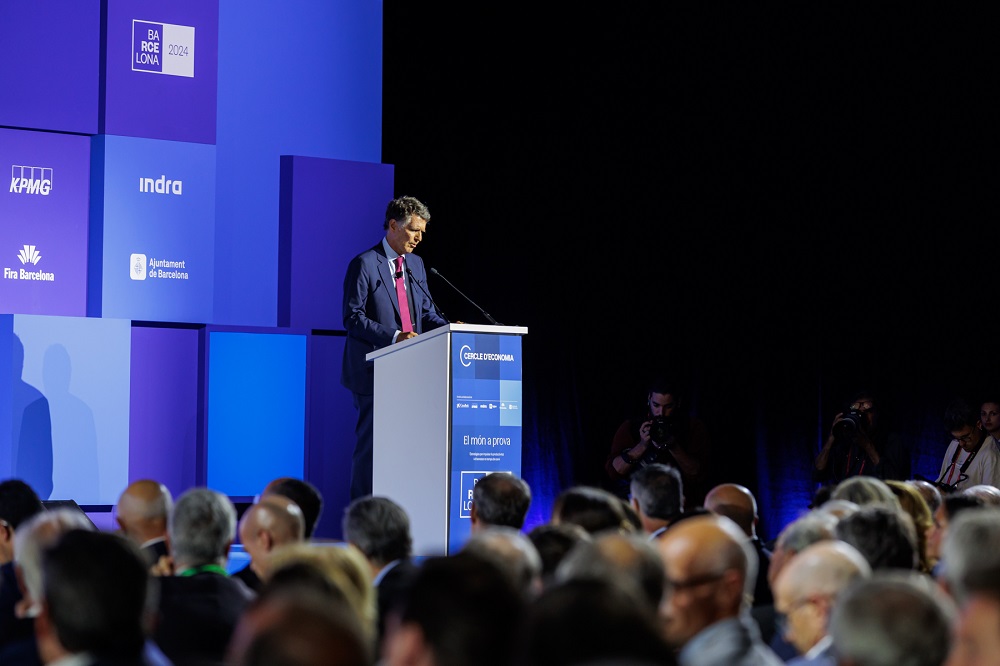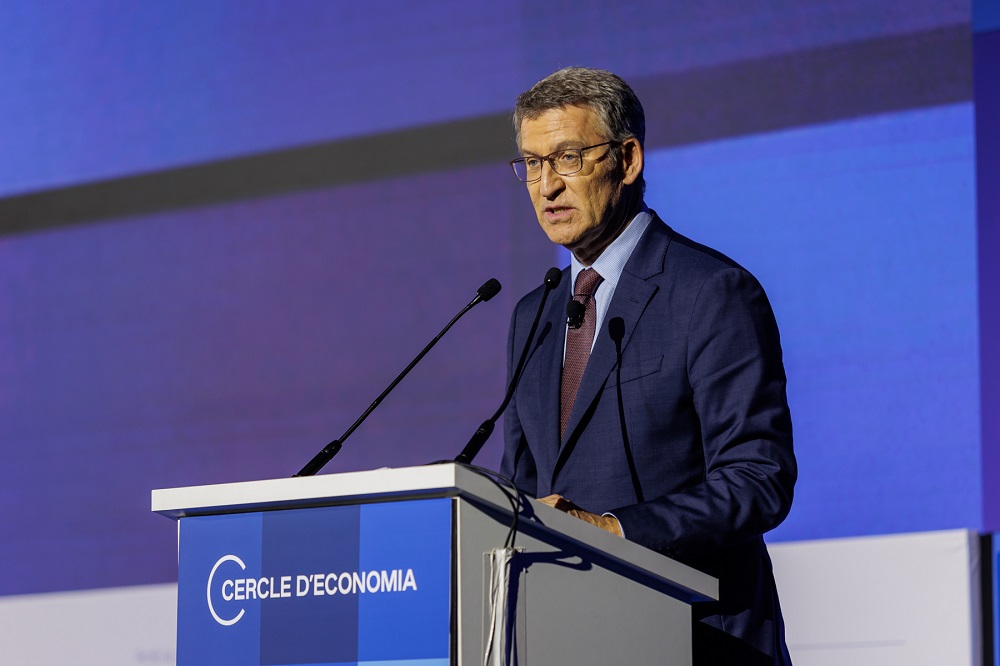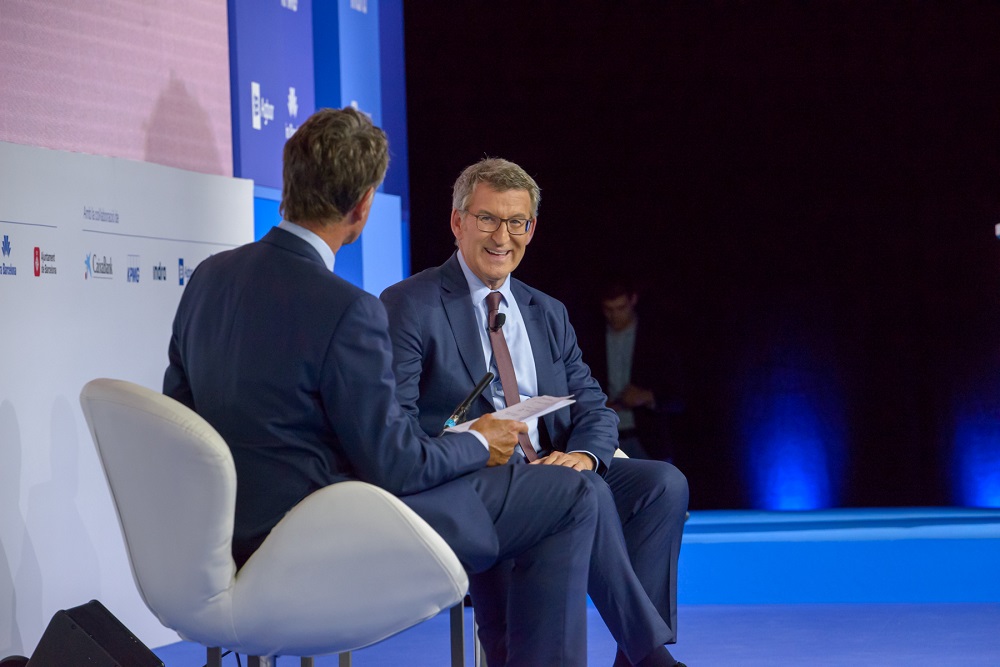Jaume Guardiola, president of Cercle d'Economia, received Alberto Núñez Feijóo, president of the Popular Party (PP), and emphasised the interesting political moment that the country is experiencing, with European elections about to arrive and Catalan elections just held, and the fundamental role played by PP.
Guardiola reflected that the data left by the Catalan elections "draw a profound change in the political map", stressing that "for the first time since the 80s nationalism or independence does not have a majority". He pointed out, however, that this new political framework leaves "a fragmented scenario where there is no clear majority of government”, and that the Cercle assesses that "a situation of deadlock that leads to a repeated election would undoubtedly be bad news for Catalonia".

Thus, Guardiola celebrated the turning point of these elections in Catalonia which, in his opinion, "reinforces the process of normalisation of Catalan political and social life" and shows that "the high levels of tension of 2017 are in the process of being overcome". He reiterated that this new phase "should allow us to address pending problems." "(From the Cercle) we understand that the Popular Party is a fundamental actor in consolidating the new political stage," he said.
After congratulating Feijóo on the significant results in the elections of 12 May, the president of the Cercle d’Economia acknowledged his harmony in economic-fiscal matters, although he disagreed with the conception of territorial distribution of state power defended by the PP. On this point, he asked the PP president for "a more proactive role in the proposal of reforms that allow the gridlock of Catalonia to be resolved" and, also, regarding the "shortcomings of the territorial model in relation to the financing of the autonomous communities and the management of public services", which he described as "outdated, insufficient and that hinders the potential for self-government".
Before giving way to the speaker, the president of the Cercle gave importance to the great responsibility that politics and civil society have to "build bridges and restore lost trust". He urged Feijóo to "avoid polarisation and agree on reforms" to build a political centre that "pushes away the extremes and creates solutions for the majority".

he president of the PP, Alberto Núñez Feijóo, assessed current Spanish politics. He did so by expressing that national politics "has worsened", unlike regional politics, which he indicated "has improved" in general. He drew a picture of Spain situated "in the midst of a selfish, radical politics and in a quarrelsome tone" and underlined two characteristics that, from his perspective, are typical of the political moment: firstly, that "political life does not revolve around the objective needs of the people, nor of the workers, nor of the companies nor of the institutions"; and, secondly, that "adventurous politics has a tendency to become chronic". In view of this, the leader of the opposition proposed a response that combines "institutional work, recourse to justice, social debate and electoral contest." He described these factors as "essential" to avoid and appease the instability that, in his opinion, is being experienced.
In the economic field, Feijóo assured that the "Spanish economy is not going on like a rocket". He reflected that Spain ranks 21st out of the 27 countries (EU) in economic growth since the pandemic and agreed with the Cercle d'Economia Opinion Piece that states that "we are facing an overwhelming economic mediocrity". In this general context, Feijóo assured that his purpose is to recover "useful politics".
Already focused on the various electoral calls, the PP representative valued the good results of his party in the Catalan elections of 12M, which "proves that it has come to stay in Catalan politics and that it will be a decisive party". He also pointed to the European women thinking of building a Europe that "is in the centre and that does not move or remain in an aging periphery, regulated by an ever-growing bureaucracy and with a lack of ambition, competitiveness and a worrying project."

"Spain's first party cannot be the fourth in Catalonia"
In the dialogue shared between Jaume Guardiola and Alberto Núñez Feijóo and in relation to the result obtained by the PP in the elections in Catalonia on May 12, Feijóo thanked the voters for their trust in a context that "was not easy" and stressed that "they exceeded all expectations". But he admitted that he was not satisfied with the results because "Spain's first party cannot be the fourth in Catalonia", especially when it "is the second engine of Spain".
In relation to the pacts, he argued that the Catalan people need a solid government - "without deceiving the citizens - and that, for the moment, "it has a political class much lower than what it needs and deserves". Regarding the fall of the independence movement, he was cautious and pointed out that "the decline does not mean that in the next election it cannot rise again".
New "essential" financing system
The president of the PP advocated what, in his opinion, is "the best solution for Spain": to seek "great agreements" and for the large majorities to govern. He stressed that it is very difficult to manage a nation when all decisions "depend on political parties with objectives that are not aimed at strengthening it, but at weakening it". As for a new financing system, Feijóo sees it as "essential" because there are autonomous communities with a debt that they will not be able to pay and pointed out that they do not have financial sufficiency.
In a European key, he pointed out that now the left is in retreat in Europe, but that the European People's Party, despite being one of the majorities, also has difficulties in some countries. And finally, in a mention of BBVA's takeover bid for Banco de Sabadell, Feijóo reiterated the "little information" they had, although he expressed his party's "opposition" to this operation.